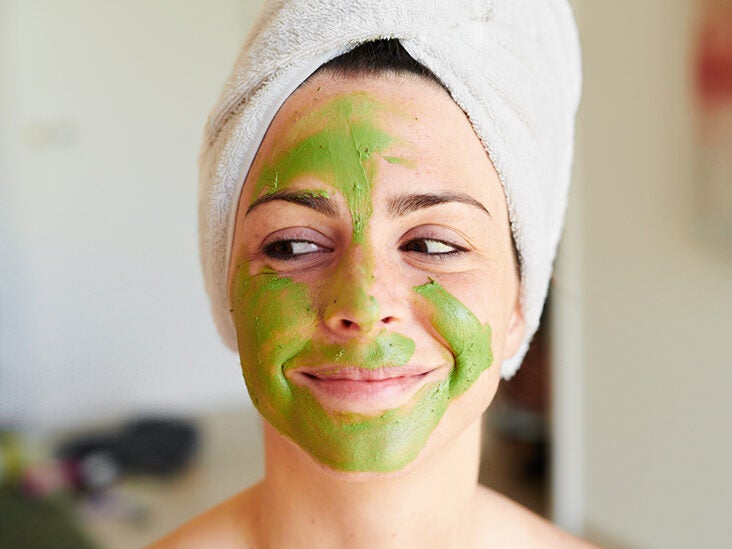Benefits of Tulsi for Skin: Uses, Safety, and DIY – Body Health World
[ad_1]

The Indian healing tradition of Ayurveda draws on ancient wisdom for looking after your skin and hair. One of the core pillars of an Ayurvedic beauty routine is using tried and tested herbs to bring out the best in your skin.
One such herbal skin remedy? Tulsi, also known as Holy Basil.
According to tradition, tulsi may help improve acne, reduce skin inflammation, and increase the speed of hair growth. But what does the research say?
Let’s dive into the facts behind the herb to understand just how your skin can benefit from tulsi.
Tulsi or Holy Basil is an aromatic perennial plant that’s native to the Indian subcontinent.
Within Ayurveda, the ancient system of medicine originating in India, the green-leafed plant has been used for thousands of years for its healing properties.
“It’s translated as ‘Holy Basil’ because of its pure energy,” says Vrinda Devani, board-certified obstetrician and gynecologist, and certified Ayurvedic practitioner. “We say it has ‘sattvic’ energy… that promotes harmony, light, wisdom, and compassion.”
In addition, tulsi is considered to have particular qualities in Ayurveda. These include:
- warming
- clarifying
- supports lung health
- supports the flow of prana or life force
- supports circulation
Additionally, tulsi is an adaptogen, which means it helps with:
- stress prevention and recovery
- weight regulation
- mental clarity
- preventing exhaustion and burnout
Devani adds that tulsi is believed to move excess Kapha (water/earth) and Vata (air) dosha. The doshas are the three elemental building blocks of Ayurveda.
While there are limited quality studies on tulsi, some research indicates that tulsi may offer several benefits for skin and hair, including that it:
- fights acne
- supports healthy skin aging
- reduces pigmentation
- soothes skin conditions like eczema
- prevents hair loss or thinning
- prevents dandruff
Acne
Tulsi may be beneficial for acne due to its antibacterial properties.
Acne is caused when hair follicles in the skin become blocked and get infected with bacteria. For people with acne-prone skin, using antibacterial ingredients like tulsi may help prevent breakouts.
A
Still, more high quality human studies are needed to confirm this.
Healthy skin aging
One 2019 study highlighted tulsi’s ability to support healthy skin aging. The study found that when applied topically, tulsi provided “potent antioxidant activity.”
Antioxidants are an essential part of caring for aging skin, as they reduce free radical production. Free radicals are known to create oxidative stress. This damages skin cells, causing fine lines and wrinkles.
Pigmentation
Thanks to tulsi’s antioxidant properties, it may also help tackle pigmentation. However, there’s no medical evidence to support this.
As mentioned, antioxidants reduce free radical production and combat oxidative stress. This can result in less pigmentation.
Antioxidant-rich ingredients also help combat environmental stressors such as UV rays and pollution, two of the main causes of pigmentation.
Eczema
Tulsi may also help with dry skin conditions like eczema, although no significant scientific studies have shown this.
Its anti-inflammatory action may reduce irritation, redness, and swelling, soothing flare-ups and itchiness. Still, more research is needed to confirm.
Hair loss or thinning
In Ayurveda, tulsi has been used to prevent hair loss or thinning and improve the thickness of hair. It’s thought that tulsi’s anti-inflammatory components may stimulate the scalp.
One older 2011 study that looked at individuals with alopecia noted improvement with the use of tulsi in aromatherapy. Still, more high quality studies are needed to explore this further.
Dandruff
Tulsi’s antifungal properties may help with dandruff when the cause is fungal, but this has yet to be backed up by rigorous scientific research.
Tulsi has a variety of traditional Ayurvedic uses for skin and hair. However, more quality human research is needed to confirm its benefits.
There are several ways to use tulsi in your skin care and general health routine depending on your needs. These include:
- facial steam
- face mask
- hair mask
- cleanser
- spot treatment
- tea
- supplements
Using tulsi in skin care products like face masks and spot treatments can be helpful for specific skin concerns. For overall skin health, tea or supplements may be the way to go.
“Taking these herbs orally also supports the entire system,” Devani says.
Ingesting tulsi daily via supplements may improve skin and hair from the inside out.
Try Banyan Botanicals Tulsi Tablets or Organic India Tulsi – Holy Basil Supplement.
Always do a patch test before applying tulsi or products containing tulsi to your skin or near your scalp. Consult a healthcare professional well-versed in herbal medicine before ingesting tulsi.
Want to add tulsi to your routine? Give these do-it-yourself recipes a try.
Tulsi facial steam
This relaxing steam is ideal to add to your nighttime routine to wind down before bed.
Ingredients:
- 1 cup fresh or dried tulsi leaves
- 5 cups water
- large bowl
Directions:
- Wash your face with a gentle cleanser and pat dry.
- Mix boiling water and tulsi leaves in a bowl.
- Drape a towel over your head and lean over the bowl for 5 to 10 minutes.
- Rinse your face with cool water and pat dry.
- Apply serum or moisturizer as usual.
Tulsi face mask for dry skin
Face masks, called face packs in India, allow tulsi to have concentrated contact with your skin.
Ingredients:
Directions:
- Wash face and pat dry.
- Mix powdered tulsi and yogurt.
- Apply to your face and leave for 10 to 15 minutes.
- Rinse with lukewarm water and pat dry.
Tulsi face mask for oily skin
Recipe from Styles at Life.
Ingredients:
Directions:
- Mix the ingredients together in a bowl.
- Apply evenly to neck and face.
- Leave on for 30 minutes and then wash off.
Conditioning tulsi hair mask
Ingredients:
- 2 tbsp. tulsi powder
- 2 tbsp. oil of choice, like argan, almond, or coconut
Directions:
- Combine tulsi powder with oil of your choice.
- Apply to clean hair. It can be wet or dry.
- Leave for a minimum of 30 minutes. You can leave overnight for intensified results.
- When you’re ready to rinse it out, massage shampoo into dry hair.
- Rinse with warm water.
- You may want to shampoo one more time to get all the oil out of your hair.
Tulsi and neem spot treatment for blemishes
Recipe by Priya Prakashan.
Ingredients:
- 1 tbsp. fresh or dried tulsi leaves
- 1 tbsp. fresh or dried neem leaves
- squeeze of lemon juice
Directions:
- Combine tulsi and neem leaves with water to make a thick paste.
- Add a few drops of freshly squeezed lemon juice.
- Apply to clean, dry skin.
- Let dry for about 10 minutes.
- Rinse with warm water and pat dry.
Tulsi cleanser
Recipe from Be Beautilicious.
Ingredients:
- 5 tulsi leaves
- 5 curry leaves
- 1/2 cup milk
- large bowl
Directions:
- Place leaves in the bowl.
- Heat milk in a pan until it boils.
- Pour the milk over the leaves.
- Let cool.
- Strain leaves from the milk.
- Use the infused milk as a rich, creamy face cleanser.
Tulsi green tea
Recipe from Teafloor.
Ingredients:
- 5 cups water
- 8 tulsi leaves
- 4 tsp. honey
- 2 tsp. green tea
Directions:
- Boil water.
- Add green tea and tulsi leaves.
- Simmer for 5 to 10 minutes based on how strong you like your tea.
- Remove from heat.
- Once cool, add honey to taste.
- Enjoy!
Tulsi is generally considered safe for most people at low doses. However, it’s best to avoid tulsi if you’re:
- pregnant
- taking blood thinners
- preparing or recovering from surgery
Always talk with your doctor and other healthcare professionals before adding new herbs and supplements to your health regimen, including tulsi.
Supplement brands aren’t regulated by the Food and Drug Administration (FDA), and they may contain fillers and contaminants. It’s important to buy tulsi from trusted brands and retailers that harvest sustainably and ethically.
One well-known source of Ayurvedic herbs and products is Banyan Botanicals. They carry a number of tulsi products in tincture, oil, powder, and tablet form.
Does drinking Tulsi tea have benefits for skin?
By drinking Tulsi tea or ingesting Tulsi supplements you can benefit from the properties of Tulsi from the inside out. “Taking these herbs orally also supports the entire system,” Devani confirmed.
Can Tulsi help whiten your skin?
While Tulsi is regularly used as an ingredient in whitening creams, there’s no evidence to support these claims.
Although the scientific research is sparse, the anecdotal evidence and use within Ayurveda suggests Tulsi leaves are an important holistic treatment for both skin and hair.
Elizabeth Bennett is a British journalist covering beauty, health, and wellness. Her work has appeared in ELLE, Refinery 29, Marie Claire, and Women’s Health. You can find her on Facebook, Pinterest, Twitter, and LinkedIn.
[ad_2]



